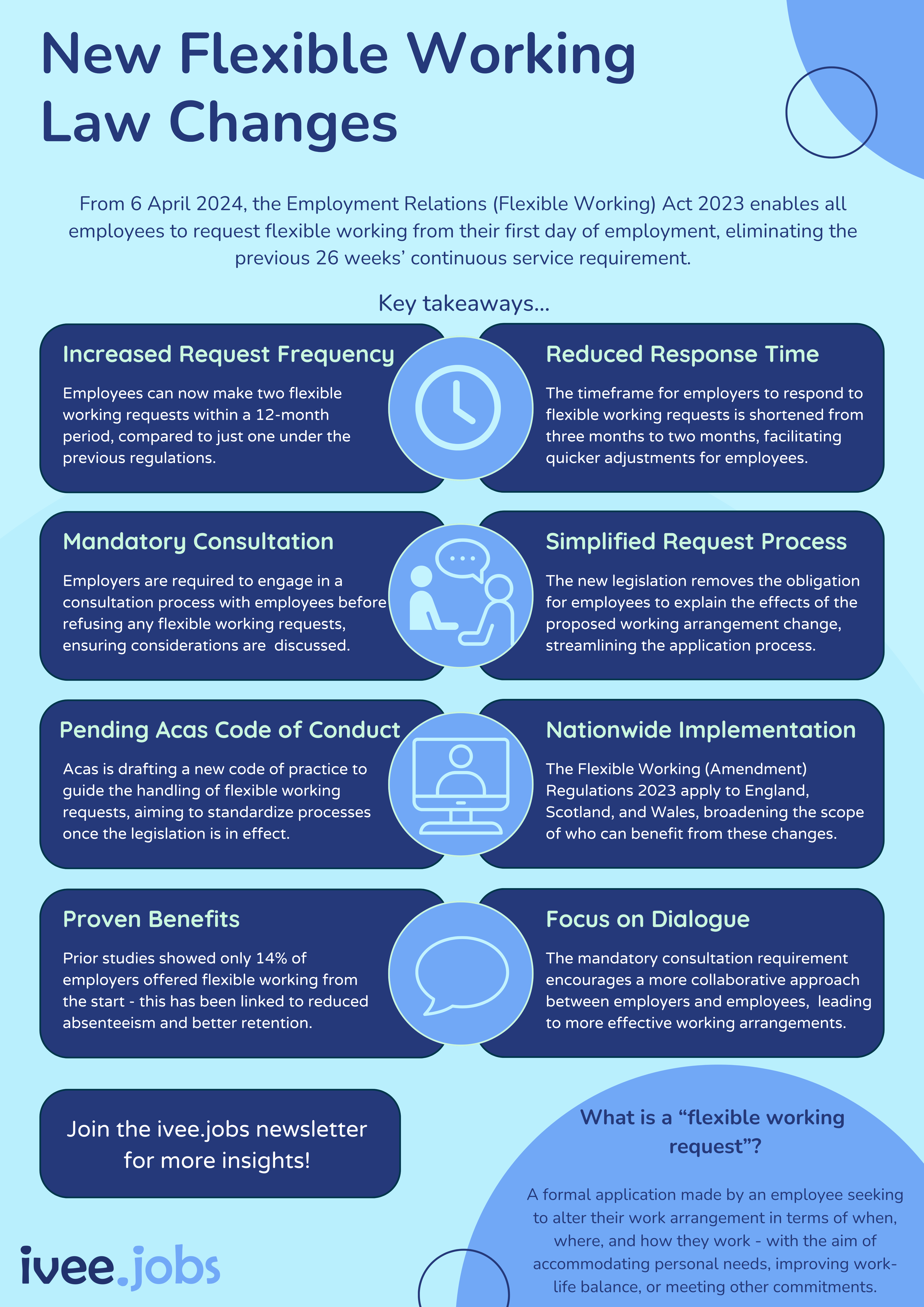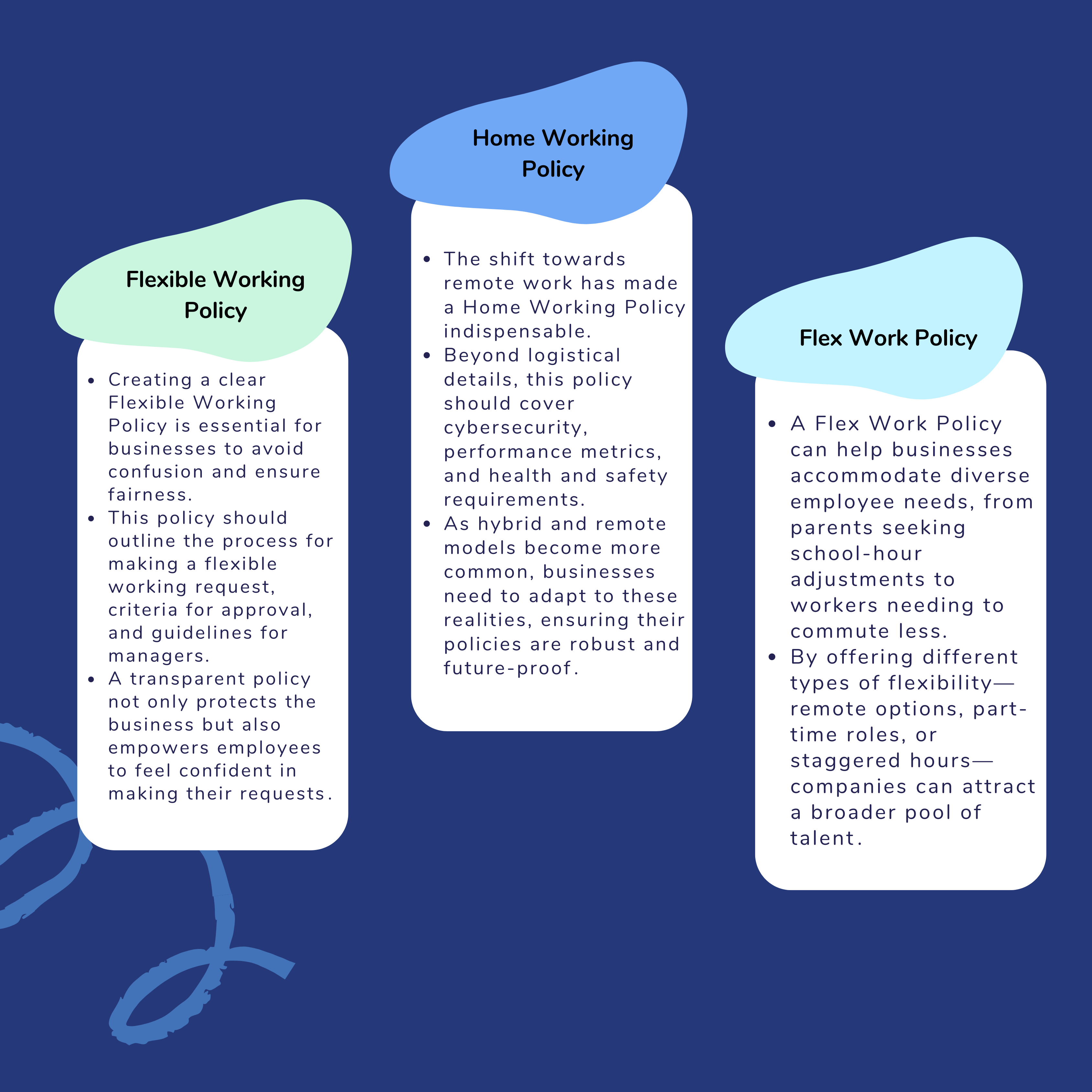In today’s evolving workplace, flexible working has become more than just a trend – it’s a legal right in many regions. With the recent updates in the Employment Relations (Flexible Working) Act 2023, understanding the legal framework around flexible work is crucial for both employers and employees. From remote working to part-time arrangements, flexible working policies are now at the forefront of creating inclusive and productive environments. In this blog post, we’ll explore the key laws and regulations, including the rights to request flexibility, employer obligations, and how to craft an effective flexible working policy that benefits everyone involved.
Jump to:
Flexible Working Law: Your Right to Ask
Flexible working laws in the UK have seen a significant shift with the Employment Relations (Flexible Working) Act 2023. This new law allows employees to make up to two requests per year for flexible working, an increase from the previous single request. The most exciting change is the removal of the requirement for employees to explain how their request impacts the business, making the process less daunting and more accessible.
Legal Changes to Flexible Working
Flexible Working and the Law: From Perk to Necessity
The perception of flexible working has shifted dramatically. It’s no longer just a perk for senior employees but a widely acknowledged necessity for improving work-life balance. The law reflects this change, though flexible working is still a right to request, not a guaranteed right. Employers must consult with employees before refusing a request, encouraging dialogue rather than a simple “no”.
1
Flexible Working Regulations: What Has Changed?
Under the new Flexible Working Regulations introduced in 2023, employers must respond to requests within two months instead of the previous three. They also have to demonstrate that they’ve discussed the request with the employee before making a decision, pushing for a more collaborative approach.
2
The Flexible Work Act: A New Era
The Flexible Work Act has been a game-changer, aiming to give employees more freedom from day one. While the “day-one right” to request flexible working has not yet been implemented, it’s expected to be introduced soon through separate regulations. This would eliminate the current 26-week service requirement, making it easier for new hires to negotiate working conditions.
3
Flexible Working Legislation: Opening Doors for Everyone
Flexible working legislation now encompasses a wide variety of work arrangements—remote work, compressed hours, job sharing, and more.
As the workplace continues to evolve, businesses are encouraged to embrace these changes to attract and retain talent, as flexibility often leads to higher job satisfaction and productivity.
Remote work
- Remote work refers to a working style where employees perform their job duties outside of a traditional office environment, often from home or other locations of their choice.
- Enabled by digital tools and internet connectivity, remote work allows individuals to collaborate with colleagues, manage tasks, and attend meetings virtually.
- This arrangement can be full-time or part-time, with flexible hours depending on the company’s policies.
- It has gained widespread popularity, especially post-pandemic, as it offers increased flexibility, work-life balance, and accessibility for workers across the globe.
Compressed hours
- Compressed hours refer to a flexible working arrangement where an employee works their full-time hours over fewer days.
- For example, instead of working five 8-hour days, an employee might work four 10-hour days.
- This setup allows for extended days off without reducing total work hours. It’s a popular option for improving work-life balance.
Job Sharing
- Job sharing is a flexible working arrangement where two or more employees share the responsibilities of one full-time position.
- Each person works part-time, but together, they cover the full range of duties associated with the role.
- This setup allows for a better work-life balance while ensuring the job gets done, making it a popular option for those seeking part-time work without sacrificing career progression.

Did you know that new flexible working laws came into effect this year?
Flexible Working Rules: Employer Obligations
Employers need to be aware of their obligations under these flexible working rules. Consultation is key. They must now provide justifications and consider alternatives before rejecting a flexible working request. These rules are designed to make the process more transparent and fair, especially for those balancing personal responsibilities with work.
Developing a Flexible Working Policy
Flexible working policies are now staples within the modern workplace. Tailoring flexibility to your workforce has never been more important in order to attract and retain talent.

Flexible Working Arrangements Policy: Inclusivity and Fairness
Implementing a comprehensive Flexible Working Arrangements Policy can make a significant difference in fostering inclusivity.
Such policies are particularly beneficial for employees with caregiving responsibilities or disabilities, helping them maintain a healthy work-life balance while contributing effectively to the business.

Join the ivee community!
Join our Facebook group. Whether you’re looking to reconnect with like-minded returners, seek advice on returning to work after maternity leave, or share your experiences, our Facebook community is here to help you navigate your journey back into the workforce.
You’ll find:
👉 Latest regulatory changes regarding maternity leave
👉 CV templates for women returning to work
👉 Latest industry updates
👉 Resources and guides to help you on your job hunt
👉 Confidence-building events, webinars and advice on all aspects of returning to work
Our Facebook community
Conclusion: Embrace Flexibility for a Better Workplace

The legal landscape around flexible working is evolving, encouraging both businesses and employees to adopt more adaptive and inclusive practices. By staying informed and developing a robust flexible working policy, employers can create a more engaged, productive, and loyal workforce, while employees gain the freedom to better manage their work-life balance.
These changes may not be mandatory until 2024, but businesses that embrace flexibility now will gain a competitive advantage in attracting and retaining talent.
Ready to find flexible work?
Create an ivee profile and start browsing our flexible jobs today!
Create profile!Featured Blog Posts
Check out the latest blog posts from ivee
Acas (Advisory, Conciliation and Arbitration Service)
Provides free and impartial information and advice to employers and employees on workplace relations and employment law.
Employment tribunal
If necessary, you can take legal action against your employer through an employment tribunal.
Trade unions
Membership in a trade union can provide additional support and representation in workplace disputes.










